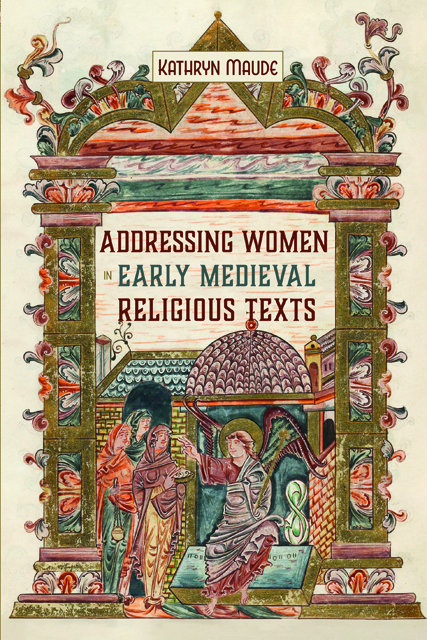Book contents
- Frontmatter
- Dedication
- Contents
- Acknowledgements
- Abbreviations
- Introduction: Behealde ge wif: Addressing Women in Early Medieval England and Scotland
- 1 Addressing Laywomen in Old English Sermons
- 2 Addressing the Recluse in Aelred’s De institutione inclusarum and Goscelin’s Liber confortatorius
- 3 Addressing Holy Women in the Life of Christina of Markyate and the Life of Margaret of Scotland
- 4 Addressing Nuns in Goscelin’s Hagiography for Wilton and Barking Abbeys
- Conclusion: Plebs ecclesiastice discipline: Addressing Women to Include and Exclude
- Bibliography
- Index
- Gender in the Middle Ages
4 - Addressing Nuns in Goscelin’s Hagiography for Wilton and Barking Abbeys
Published online by Cambridge University Press: 14 January 2023
- Frontmatter
- Dedication
- Contents
- Acknowledgements
- Abbreviations
- Introduction: Behealde ge wif: Addressing Women in Early Medieval England and Scotland
- 1 Addressing Laywomen in Old English Sermons
- 2 Addressing the Recluse in Aelred’s De institutione inclusarum and Goscelin’s Liber confortatorius
- 3 Addressing Holy Women in the Life of Christina of Markyate and the Life of Margaret of Scotland
- 4 Addressing Nuns in Goscelin’s Hagiography for Wilton and Barking Abbeys
- Conclusion: Plebs ecclesiastice discipline: Addressing Women to Include and Exclude
- Bibliography
- Index
- Gender in the Middle Ages
Summary
In the previous chapters of this book, the relationships I analysed were all between men and women. The intimacies – both forced and welcomed, imagined and actual – were forged across gendered lines in the moment of address from a man to a woman. In this chapter, though, the intimate relationships that I am interested in are same-sex. Although the hagiography for Wilton and Barking abbeys was commissioned by the female communities and written by Goscelin, Goscelin does not address the communities of nuns directly in the texts. Instead, he presents the communities’ saints to their bishops, creating male-male relationships that exclude the nuns even as they work on their behalf. And yet, simultaneously, the visionary direct address between nuns and saints in the texts creates intimate relationships between women, which exclude the male clerical establishment. We see, for the first time in this book, communal relationships between women created in the moment when saint addresses nun and nun addresses saint.
The nuns of Wilton and Barking abbeys use Goscelin’s ability to build relationships with powerful men in order to ingratiate themselves with their new post-Conquest bishops. Wilton Abbey commissioned Goscelin to write the Legend and Translatio of Edith between 1080 and 1082. Goscelin addresses the prologue to Archbishop Lanfranc of Canterbury, re-presenting Wilton’s pre-Conquest saints to the new Church hierarchy. Probably in direct imitation of the richer and more powerful Wilton Abbey, Barking Abbey then commissioned Goscelin to write the hagiography of their saints sometime between 1086 and 1100. At this time in particular the nuns of Barking needed to demonstrate their authority to Bishop Maurice of London, as they had ignored his prohibition of their church-building programme.4 Reproducing the framing of his prologue to the Legend of Edith, Goscelin addresses the prologues of both the Life of St Ethelburga and the Life of St Wulfhilda to Bishop Maurice. The Legend of Edith’s address to Lanfranc provided a useful model for the Barking texts’ address to Bishop Maurice in an attempt to counter his opposition to their new church.
The male–male relationship between Goscelin and the bishops works in the nuns’ interests but also excludes them from the narrative of their own saints. In the direct address in the Lives themselves, however, these texts create communal intimacy between women that excludes external male figures.
- Type
- Chapter
- Information
- Addressing Women in Early Medieval Religious Texts , pp. 129 - 168Publisher: Boydell & BrewerPrint publication year: 2021



